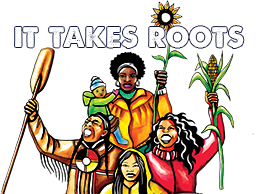http://therealnews.com/t2/index.php?option=com_content&task=view&id=31&Itemid=74&jumival=18189
Amid controversy and concerns about inclusivity, marchers of color call for continued resistance to all forms of oppression
CROWDS: (cheering) … We will not support a Trump Supreme Court…DHARNA NOOR: The Women’s March on Washington is being called one of the largest demonstrations in U.S. history. The Real News is here to catch up with some demonstrators about the issues that they think will face women, and specifically women of color, with the coming Trump administration.Hundreds of thousands of people took to the street in opposition to President Donald Trump’s policy proposals and rhetoric. A crowd so massive, that organizers decided to call off the planned march to the White House. Marchers expressed a number of concerns about what Trump’s administration will mean for women in the U.S.WOMAN: If 50% of Congress could, like, have children, or were women, then we wouldn’t be arguing about half of the stuff we are, especially reproductive rights.WOMAN: Equal pay, affordable healthcare, women’s rights.WOMAN: Well, I’m worried about healthcare and reproductive rights, of course, and abortion access.WOMAN: Black people won’t have rights, women won’t have rights, he’s taking away healthcare from children. This is outrageous.CROWD: (indistinct chanting)DHARNA NOOR: Many were also disturbed by Trump’s attitude towards communities of color.WOMAN: He wants to deport all the immigrant, undocumented people.WOMAN: If Trump thinks he runs this town, … will shut it down…DHARNA NOOR: So, lead organizers of color from across the nation came to D.C. to ensure that their voices were heard. Melissa Miles, an organizer with the Ironbound Community Corporation, in Newark, New Jersey, said Trump doesn’t represent the interests of her city.MELISSA MILES: So, how can you have a cabinet full of millionaires, except for at the expense and on the backs of others? So, women, children, immigrants, poor people - we are on the front lines, and we have been, in this country, all along.DHARNA NOOR: Some were concerned about the role of women of color in the demonstration. Initially, almost all of its main organizers were white. The march was originally called the Million Women March, a name borrowed from the massive 1997 demonstration, organized by and for black women. Ashley and Colby, two D.C. residents grappled with these controversies when deciding whether or not to attend.ASHLEY: We went back and forth about it, because we had some conflicted feelings about how this march started. The lack of inclusivity, the lack of intersectionality, and so we were a little bit… We went to dinner last night and talked about it and we were, like, eh… But we woke up this morning and we felt inspired. We felt like, you know, we can talk about it and blog about it, and write on the Internet about it all day, but it matters when you come out and show up and speak up, and so that’s why we’re here.COLBY: I think there’s support in numbers, there’s strength in numbers. You need black women as part of any revolution, so we’re here, and we’re here to be part of that. There aren’t a ton of us, but we’re happy to be out here with everyone.DHARNA NOOR: Ashley says though at times it’s difficult, having conversations that address these issues is critical in building successful women’s movements.ASHLEY: I think that a lot of women - white women - get very defensive about it, and don’t really know how to respond, because they feel like they’ve put so much into it, and how dare anybody, you know, we’re all women, we should come together. We’re sisters, how dare you try to undermine what we’re doing? And it’s not… that’s not what I’m trying to do at all. I’m not trying to undermine it at all. I’m just trying to make it better for next time.DHARNA NOOR: Miles and others expressed the need for resistance beyond the Women’s March, resistance that fights for all women and all people of marginalized communities.MELISSA MILES: We’re here to march. You know, that is largely made up of white women, you know, probably mainstream, which is wonderful. I’m glad Trump pissed them off. But, you know, when black and brown communities come under attack, when immigrant communities come under attack, when Muslims come under attack, I hope they’ll come out in the same force.————————-END
